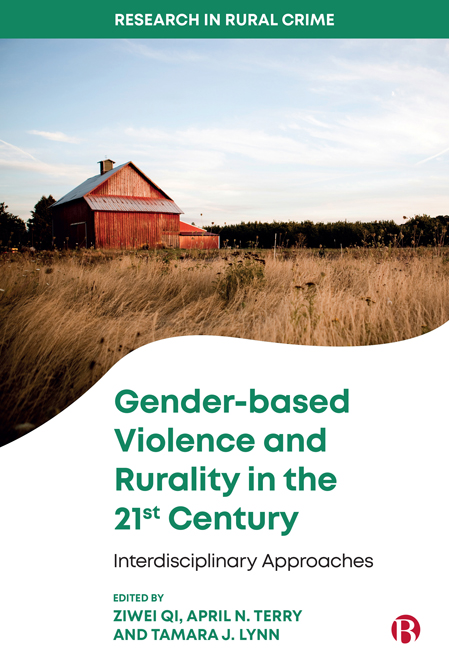Book contents
- Frontmatter
- Contents
- Series Preface
- List of Figures and Table
- List of Abbreviations
- Glossary
- Notes on Contributors
- Foreword
- 1 Understanding Rurality and Gender-based Violence
- PART I Rurality and Gender-based Violence
- PART II Beyond the Rural/Urban Divide: Critical Issues in Gender-based Violence
- PART III Access to Rural Justice: Economic Consequences and Policy Implications
- Index
Foreword
Published online by Cambridge University Press: 20 January 2024
- Frontmatter
- Contents
- Series Preface
- List of Figures and Table
- List of Abbreviations
- Glossary
- Notes on Contributors
- Foreword
- 1 Understanding Rurality and Gender-based Violence
- PART I Rurality and Gender-based Violence
- PART II Beyond the Rural/Urban Divide: Critical Issues in Gender-based Violence
- PART III Access to Rural Justice: Economic Consequences and Policy Implications
- Index
Summary
In 1988, my close friend and colleague Martin D. Schwartz and I published a review essay in the journal Social Justice (15[3– 4]) noting that only a few areas moved as far and fast as the violence against women movement. Back then, advances in the social scientific study of this harm were much faster than the vaunted leaps in some of the physical sciences. Fast-forwarding to this current era, I repeat this observation. Indeed, it is now a major challenge to keep up with the empirical and theoretical work on one of the world's most compelling social problems. That the field's leading periodical, Violence Against Women: An International and Interdisciplinary Journal, is published 16 times a year is an important statement on the amount of time, money and effort devoted around the world to enhancing a social scientific understanding of the myriad of ways in which women are targeted by intimate partners and strangers in face-to-face and digital contexts.
Still, until 2006, the urban-centric bias that plagued the study of most other types of social problems, including crimes of all sorts, was the overriding way of knowing found throughout the extant interdisciplinary literature on woman abuse. There was episodic concern with rural women's experiences with sexual assault, beatings, stalking and the like, but such victimisations were not of major interest until recently to social scientists, practitioners, politicians and the general public. Consider that it was only 20 years ago that an exhaustive bibliography on the occurrence of violence against women in nonmetropolitan places could be written on an index card.
I never thought there would be a scholarly anthology resembling this one when I launched my own sociological work on male-to-female separation/divorce sexual assault in rural southeast Ohio at the start of this millennium. Moreover, given heteronormativity's hegemonic firm grasp on the social sciences, I then also assumed that gender-based violence against lesbian, gay, bisexual, transgender and queer people in rural and remote areas would permanently receive selective inattention. Ziwei Qi, April N. Terry and Tamara J. Lynn proved me and others wrong, and they should be commended for helping to queer the study of gender-based violence in the heartland.
- Type
- Chapter
- Information
- Gender-based Violence and Rurality in the Twenty-first CenturyInterdisciplinary Approaches, pp. xx - xxiiPublisher: Bristol University PressPrint publication year: 2023

